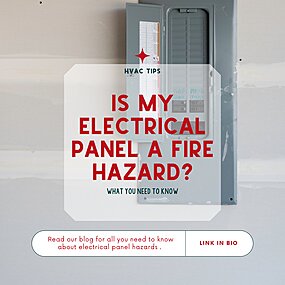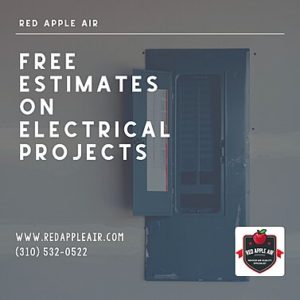An electrical panel is a service box that connects the main power line to a home, and distributes electrical currents to the different circuits within the home. Circuit breakers and fuses prevent over-currents during the distribution of power to different circuits. Circuits that are faulty or overloaded could be dangerous, and possibly start a fire in your home.
 When to upgrade?
When to upgrade?
Most electrical issues are caused by a faulty electrical panel because the panel is linked to the entire electrical system. If the panel is malfunctioning, the damage can easily spread throughout the whole house. Your electrical panel is vital to the overall health of your electrical system and your home.
The following sections explain some reasons why you might want to consider an electrical panel upgrade for your home in the near future:
Your Home uses a Fuse box
In the 1960s Fuse boxes were in every home, and some homes still have them. If your home has a fuse box it should be replaced with an electrical panel. It’s not that the fuse box is dangerous itself, but it can be pretty inconvenient and expensive over time, to have to keep replacing fuses. Rather, it’s the various stopgap measures people may have taken over the years to keep the boxes functional.
For both fuse boxes and circuit breakers, you should inspect the electrical panel, check for things such as:
- Whether it is unusually warm or hot
- You hear crackling sounds coming from it
- You see corrosion or rust on the circuit breakers
There are still some faulty panels out there, so make sure that yours is not one of them. If it is, it should be replaced as soon as possible. If you are concerned that your electrical panel might be faulty or a recalled model that was installed many years ago, do a search for the manufacturer’s name or call an electrician.
Wear and tear on your Electrical System
Look for signs of potential danger from a worn and/or over tapped electrical system; such as,
- Flickering, blinking, or dimming lights
- Frequently tripped circuit breakers or blown fuses
- Warm or discolored wall plates
- Cracking, sizzling, or buzzing from receptacles
- Burning odor coming from receptacles or wall switches
- Mild shock or tingle from appliances, receptacles, or switches
- Frequent need to reset circuit breakers.
- Appliances that are not running at their full capacity
- Utility bills that seem unusually high

Panel Replacement
Reasons why a panel would need to be replaced include:
- Water damage
- Mouse droppings
- Damaged wires
- Old age
More often a panel replacement accompanies an all-out service upgrade.
How Much Does It Cost to Upgrade Electrical Panel?
You may be curious about the cost to upgrade your electrical panel for your home. And rightly so.
Electrical panel upgrades can be expensive. The average cost is up to $2,000 for the labor, plus more for supplies. It could end up costing more, depending on what the electrician finds when they really get into the job.
Previously unknown problems could be discovered while the electrician is doing his work. For example, they might discover ungrounded electrical outlets in the house, a meter or any number of other things. Remember, there’s a lot going on inside your walls that are not known at the time of an estimate.
Once the work starts, it is possible that something could go amiss. However, anything that makes a difference in the overall safety of your home is worth some money. This kind of service upgrade takes a lot of materials and time—sometimes days, especially with only one electrician working.
Find the right electrician
In today’s world, checking a company’s local reviews on Google or Yelp is one of the best ways to find an electrician or any other contractor. Most of the time a business with a lot of reviews and a high star rating values their reputation and will make sure you are completely taken care of.
What to ask Electricians
You should not assume that someone who self-identifies as an electrician actually has the experience and credentials needed to do the job. There are a lot of amateurs out there seeking work these days! So be sure to check them out and ask the right questions.
We recommend talking with at least three electricians before hiring. Ask them things such as:
- Are you licensed?
- Are you insured?
- What kind of work do you do most?
- What special training/experience do you have for this kind of work?
- Can you provide references (for past jobs similar to mine)?
- What does your estimate include?
- Do I need a permit for the work I’m requesting? Will you obtain it?
- Who (all) will perform the work?
- When would you be able to do this work?
- (How) do you guarantee your services?
Be sure to take notes on their answers. That way, you will have points of comparison for the different candidates and won’t lose track of important details between the interview and the hire.




